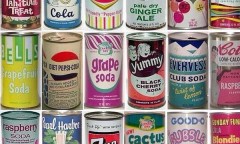By Steve Pak, | March 24, 2016

UK Fruit Juices and Drinks
Fruit juices, juice drinks, and smoothies that are advertised as healthy for kids often contain the amount of sugar a child should consume in an entire day, based on a new study. Researchers' findings come at a time when the United Kingdom has announced a tax on sugary soft drinks but does not include such fruit-flavored beverages sold in cartons or bottles.
Like Us on Facebook
The new study was published in the journal BMJ Open. It found that among 203 fruit drinks, fruit juices, and smoothies stocked by UK supermarkets nearly half had a child's recommended sugar intake of about five teaspoons.
Simon Capewell was one of the study's authors and is a professor of the department of public health and policy at the University of Liverpool. He shared that the drinks are marketed frequently to children and their parents. Such fruit drinks are often packaged in bright colors, and marketed with cartoons and animal characters.
Capewell explained that kids drinks are often advertised as providing health benefits such as being full of fruit or having high levels of Vitamin C, according to The Guardian.
The UK researcher also shared that there are no limits about how companies can market their juice drinks. That results in over one-third of the fruit beverages having more sugar than fizzy sodas.
Researchers were surprised by the amount of hidden sugar in the drinks and smoothies, and the number of popular brands that contained a high level of processed cane sugar.
Statistics show that 20 percent of British children between the ages of four to five, and one-third of kids aged 11 are either overweight or obese. Meanwhile, youngsters between four and 10 years old get 30 percent of their s daily sugar intake from sodas.
Sugar also results in tooth decay. It is the top cause of England's children being admitted to the country's hospitals.
In related news a recent study by Australian and Indian researches showed that eating sugar could cause brain defects like those resulting from abuse or stress, according to RT. They focused on the hippocampus brain region that is responsible for storing people's long-term memories.
Here's how to make fresh orange juice:
-
Use of Coronavirus Pandemic Drones Raises Privacy Concerns: Drones Spread Fear, Local Officials Say

-
Coronavirus Hampers The Delivery Of Lockheed Martin F-35 Stealth Fighters For 2020

-
Instagram Speeds Up Plans to Add Account Memorialization Feature Due to COVID-19 Deaths

-
NASA: Perseverance Plans to Bring 'Mars Rock' to Earth in 2031

-
600 Dead And 3,000 In The Hospital as Iranians Believed Drinking High-Concentrations of Alcohol Can Cure The Coronavirus

-
600 Dead And 3,000 In The Hospital as Iranians Believed Drinking High-Concentrations of Alcohol Can Cure The Coronavirus

-
COVID-19: Doctors, Nurses Use Virtual Reality to Learn New Skills in Treating Coronavirus Patients










